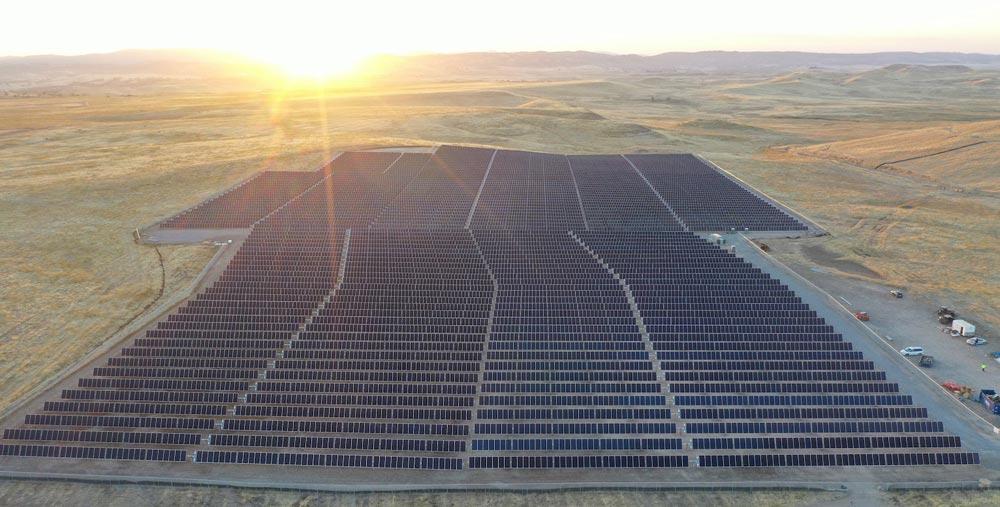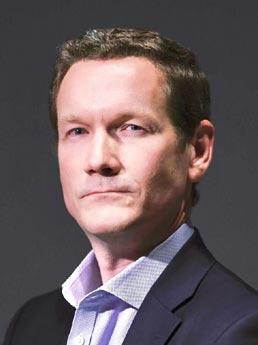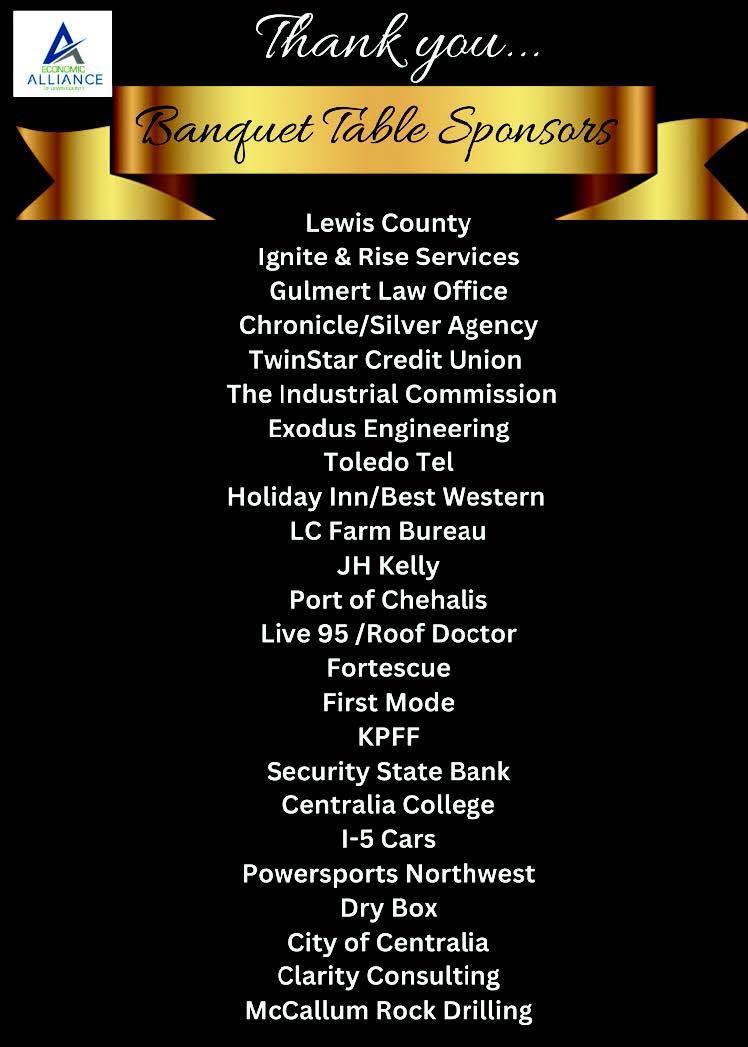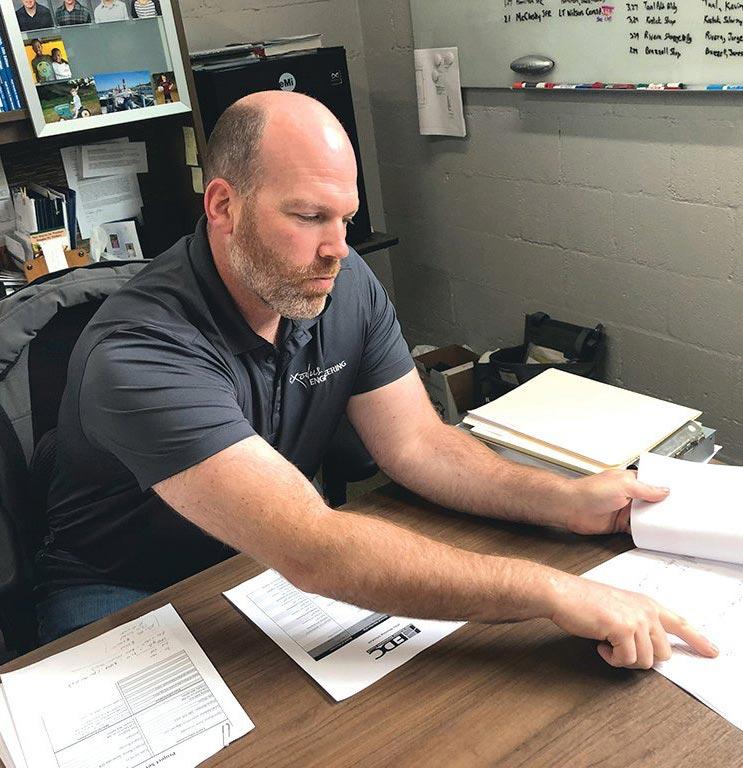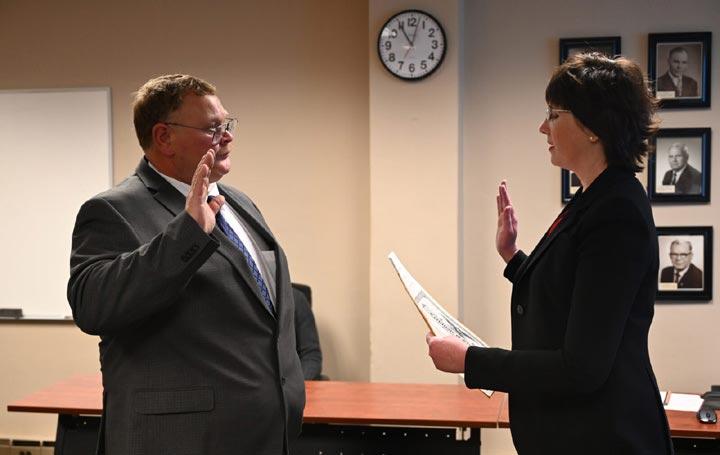Courtesy photo / Ameresco – An Ameresco solar photovoltaic project in San Joaquin County, California.
Ameresco Sees Lewis County as an Emerging Power
Global Company Joins the Alliance, Believes the Region Is Poised for a Power ‘Renaissance’
By the Economic Alliance of Lewis County
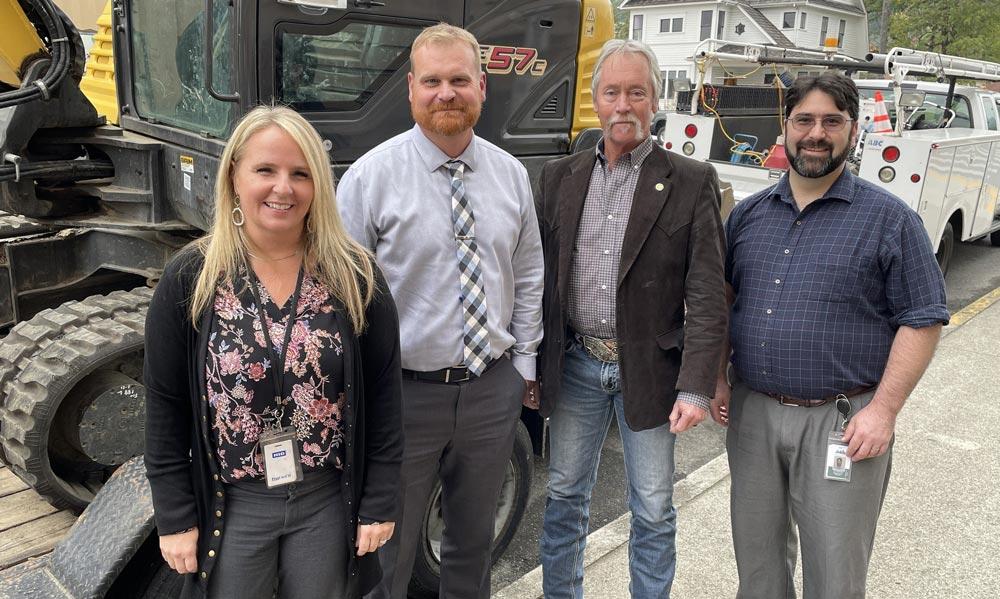
Coutesy photo / Lewis County Commissioners – From left, Lewis County Budget Administrator Becky Butler, County Manager Erik Martin, ToledoTel VP/COO Dale Merten and County Housing and Infrastructure Specialist Eric Eisenberg following the October 2022 kick-off meeting celebrating a $23.5 million award to expand broadband into Winlock and beyond.
ToledoTel Moving Forward with Massive Broadband Expansion
With $23.5M Granted, Winlock’s 2,300-Plus Homes and Businesses Will Soon Have High-Speed Internet By the Economic Alliance of Lewis CountyAt a business meeting of the Lewis County Commissioners on Jan. 3, the county approved a grant contract with the Washington State Broadband Office awarding Lewis County $23.5 million for the installation of fiber optic broadband infrastructure to every parcel within Winlock and the surrounding rural areas through ToledoTel.
This was essentially a formality, as in October of 2022 Lewis County Commissioners and ToledoTel held a kick-off meeting for their public-private partnership to expand high-speed internet services in and around Winlock.
The grant will pay the way for internet service to eventually be extended to over 2,300 homes and businesses in Winlock. The total project will consist of 134 miles of mainline construction. ToledoTel will now begin engineering and design of the project, plus provide an additional $2.35 million in matching funds toward the project.
The Lewis County Commissioners’ resolution accepting the grant stated, “The broadband services from this project will be a game-changing boost to the Winlock area’s growth, economic development and quality of life.”
Lewis County Manager Erik Martin said this is a great opportunity for South Lewis County.
“There’s the convenience, there’s business purposes; all those are really vital and becoming more and more a part of everyday life, and we want to provide those services to everyone in Lewis County that we can,” Martin said. “This project is really the beginning, in terms of getting service out to folks, and we want to focus on getting broadband out to all rural areas and all residents of Lewis County.”
At the completion of the project, which is expected to run through 2026, the county will own the broadband infrastructure and ToledoTel will use the fiber optic lines to assist in connecting businesses and homeowners to internet service.
“Broadband infrastructure and access to high-speed internet service is critical to residents, businesses, schools, hospitals and public safety in Lewis County,” said Lewis County Commissioner Dr. Lindsey Pollock. “This is a big step in addressing the areas that are unserved or underserved, bringing us one step closer to closing the digital divide.”
The Washington State Broadband Office earlier announced funding for 13 construction projects that will deliver reliable, high-speed internet access in 14 communities when completed. The $145 million in Broadband Infrastructure Acceleration grants move Washington another step closer to its ambitious goal of connecting all residents of the state to broadband infrastructure by 2028.
“Infrastructure is the foundation for digital equity. From education and healthcare to e-commerce and community services, the daily essentials needed for people and our economy to thrive are increasingly found online,” said Washington Commerce Director Lisa Brown “Washington state’s goal is to ensure all of our residents have access to affordable high-speed internet, as well as the devices, skills and confidence needed to connect with critical resources.”
Broadband Infrastructure Acceleration Grants conditionally awarded, pending final contract execution, are as follows:
• Lewis County — $23.5 million, estimated project completion by Dec. 31, 2026
• Clallam County — $20.27 million, estimated project completion by Dec. 31, 2023
• Spokane Tribe of Indians — $16.8 million, estimated project completion by Dec. 31, 2024
• Snohomish County — $16.7 million, estimated project completion by Jan. 31, 2024
• Washington independent Telecommunications Association — $14.86 million for two sub-projects serving Mason and Island Counties, estimated project completion by Dec. 31, 2024
• King County — $11.8 million, estimated project completion by Jan. 31, 2023
• Adams County — $10.3 million, estimated project completion by Dec. 1, 2023
• Public Utility District #1 of Jefferson County — $9.7 million, estimated north fiber project completion by Dec. 1, 2024
• Nisqually Indian Tribe — $6.77 million, estimated OAN Phase II project completion by Dec. 31, 2023
• Lincoln County — $5.2 million, estimated Connecting Lincoln County project completion by Dec. 31, 2023
• Confederated Tribes of the Colville — $4.09 million, estimated broadband acceleration project completion by Dec. 31, 2024
• Port of Bellingham — $4 million, estimated Whatcom County expansion project completion by Dec. 31, 2024
• Port of Whitman County — $1.06 million, estimated project completion by Dec. 1, 2023
Applications for a second round of grants to award an additional $120 million will open later this spring. Input from stakeholders is instrumental in shaping how the office distributes funds, according to Ann Campbell, manager of infrastructure programs for the Washington State Broadband Office, noting that local community broadband organizing groups are a focal point for this effort.
Campbell said for this funding round the office prioritized projects that would deploy service in unserved areas, or areas lacking access to reliable (wireline connection) service at speeds of at least 25 megabits per second (mbps) download and 3 mbps upload (25/3).
The selected projects will offer speeds of 1 gigabit per second symmetrical service unless otherwise precluded by topography and geography.
ToledoTel Named Business of The Year at Chamber Banquet
The Centralia-Chehalis Chamber of Commerce held its annual banquet in the TransAlta Commons at Centralia College on Friday night, Jan. 20..With hundreds in attendance, Chamber Executive Director Cynthia Mudge announced ToledoTel as the Business of the Year. Vice President and CEO Dale Merten accepted the award on behalf of the South Lewis County business, acknowledging other employees in the crowd. He noted the company’s effort to expand broadband internet to the Winlock area through a partnership with Lewis County.
Lewis County PUD Hires Plotz as Its New General Manager
Longtime Lewis County Resident Has Deep Roots with the PUD; His Father Worked for the Power Utility for Most of His Life By the Economic Alliance of Lewis CountyCounty Commissioners Pass Resolution Honoring Gary Stamper
WSDOT Is Asked to Rename View Pullout the ‘Gary Stamper Memorial Overlook at Riffe Lake’ By the Economic Alliance of Lewis County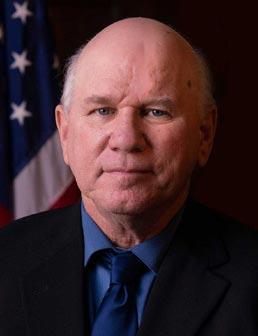
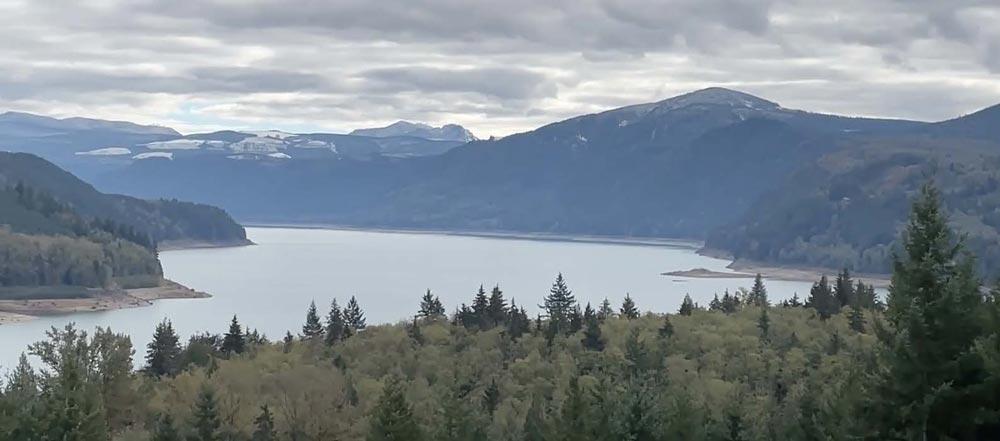
County Commissioners – The view from the Riffe Lake Overlook.
I’m Excited to Help the Alliance to Continue Its Growth
The Alliance Has Built a Solid Organization; I Want to Assist in Attracting Family-Wage Jobs to Lewis County By Luke Moerke Chair – Economic Alliance of Lewis County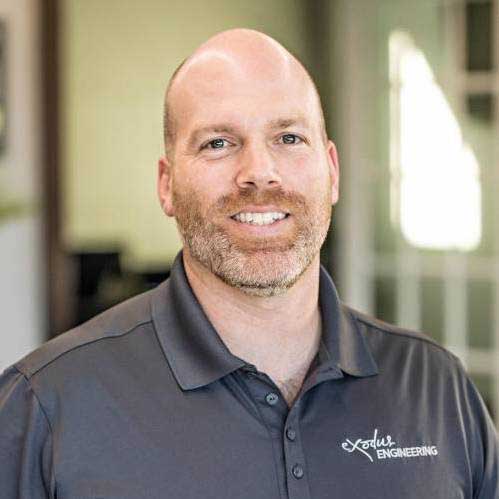
Luke Moerke
I’m excited to be the new chairman of the Economic Alliance of Lewis County and the possibilities this dynamic organization has to offer.
I started my new post this month, following the departure of former Chair Ben Kostick, who led the Alliance as it transitioned to a new team led by Executive Director Richard DeBolt, starting in March of 2021. Ben held a solid, steady and friendly demeanor at a time when the Alliance needed such direction. It is a pleasure to follow in his footsteps and I want to publicly thank him for his time as chair.
I’m excited because Richard has built a strong staff that does amazing work. The Alliance is taking on a lot of business assistance and development projects, from helming the website Discover Lewis County to a higher level, to the day-to-day assistance to Lewis County businesses that often just need a helping hand.
I’m excited to be a part of the effort to bring cutting edge businesses to Lewis County and nuts and bolts manufacturing jobs that will bring family-wage jobs to our area; attracting new high-energy labor and also allowing our sons and daughters to remain in Lewis County in these decent jobs.
Simply put, I want to help the Alliance to make this community a better place.
I also believe, while the Alliance is becoming the go-to economic driver of Lewis County, we can do even better. We can build up the Alliance’s presence in the county, region and state. Many don’t know enough about the Alliance, and I aim to improve those relationships. I’m looking forward to enhancing transparency at the Alliance, as well as building upon the community relations between the Alliance and the public.
Mostly, I am excited to be in a position to make a difference in a place where I grew up. I was born and raised in Lewis County, and before that, my father and grandfather both operated successful businesses in this county in the logging and drilling industries.
At my business — Exodus Engineering based in Centralia — “I endeavor to be a family friendly and faith based business that continues to make a difference in the community.”
One of our driving principles at Exodus Engineering, is “to maintain integrity in business practices, and be someone who is down to earth and easy to work with.”
I want to bring that same attitude — trusted, down to earth and easy to work with — to the Alliance and in turn to all of Lewis County.
•••
Luke Moerke is chairman of the Economic Alliance of Lewis County, and president and owner of Exodus Engineering in Centralia.
PROBLEM SOLVING
Moerke Starts His Term as Economic Alliance Chairman
He Brings a Strong History with
Lewis County and a Successful
Business Acumen to the Alliance
By The Economic Alliance of Lewis County
SPONSORED CONTENT
Thurston-Lewis-Mason Central Labor Council
Thurston-Lewis-Mason Central Labor Council
BY THE WASHINGTON STATE
LABOR COUNCIL, AFL-CIO
Hadaller Sworn in as Lewis County PUD’s Newest Commissioner
By the Economic Alliance of Lewis CountyMichael Hadaller was sworn-in as Lewis County PUD commissioner at the agency’s regular commission meeting on Tuesday, Dec. 20, 2022.
Lewis County Commissioner Dr. Lindsey Pollock administered the oath of office for Commissioner Hadaller at the meeting held at the PUD’s Chehalis office.
“It is the start of a new adventure,” said Commissioner Hadaller. “I hope we can get everyone working together for the good of our ratepayers and our PUD.”
Commissioner Hadaller, an East Lewis County business owner, represents District 3 which comprises the southern and eastern parts of Lewis County, including Toledo, Onalaska, Ethel, Salkum, Silver Creek, Cinebar, Mossyrock, Morton, Mineral, Glenoma, Randle and Packwood.
Commissioner Hadaller joins commissioners Michael Kelly and Ed Rothlin on the board after winning the seat in the fall to represent District 3. He officially took office on Jan. 1, 2023.
Lewis County PUD is a community-owned, locally governed utility providing power services and telecommunications infrastructure to about 33,000 customers throughout most of Lewis County and adjacent communities. Commission meetings are generally the first and third Tuesday of every month at 10 a.m. PUD Commissioner terms are six years.
As set by state law, it is the board’s responsibility to set utility policy and to hire and oversee the work of the general manager.
In November of 2022, the PUD commissioners passed a balanced, two-year budget for 2023 and 2024 with no expected rate increases. This was accomplished through a combination of cost management efforts and strategic investment. This will allow the PUD to continue reinforcing their system, invest in broadband and provide great service
While the cost of goods has risen over the past five years, PUD staff have worked to responsibly limit rate increases, according to a news release.
“To pass on a 0% increase for the customers is significant because inflation is impacting everyone including the PUD,” said Commissioner Rothlin. “We will continue to maintain not only affordability but also safety and reliability and in the future that will be a focus.”
ABOUT DISTRICT 1 AND DISTRICT 3 COMMISSIONERS:
Commissioner Rothlin, a retired superintendent of the Chehalis School District, represents PUD Commission District No. 2. District No. 2 generally comprises the western portion of Lewis County, including parts of Chehalis and Centralia, Adna, Boistfort and Pe Ell.
Commissioner Rothlin was appointed to the Board of Commissioners on Nov. 1, 2019. He was subsequently elected to the Board of Commissioners in 2020, with his new term beginning in January of 2021.
Commissioner Kelly, a computer and controls professional at TransAlta Corporation’s Centralia coal-fired power plant, represents PUD Commission District No.1 which includes the central part of Lewis County east of Centralia and Chehalis, including the Big Hanaford, Little Hanaford, Coal Creek, Logan Hill, North Fork, Forest, Napavine, Evaline and Winlock areas.
Commissioner Kelly was elected to the Board of Commissioners, with his term beginning in January of 2021.

